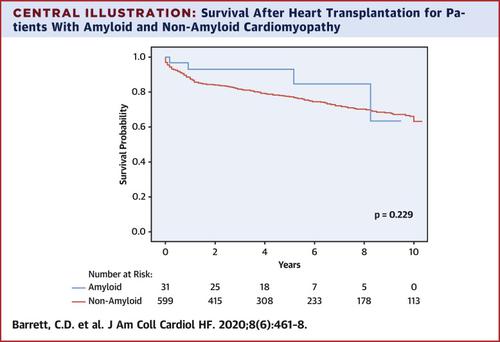当前位置:
X-MOL 学术
›
JACC Heart Fail.
›
论文详情
Our official English website, www.x-mol.net, welcomes your
feedback! (Note: you will need to create a separate account there.)
Outcomes in Patients With Cardiac Amyloidosis Undergoing Heart Transplantation.
JACC: Heart Failure ( IF 10.3 ) Pub Date : 2020-05-06 , DOI: 10.1016/j.jchf.2019.12.013 Christopher D Barrett 1 , Kevin M Alexander 2 , Hongyu Zhao 3 , Francois Haddad 2 , Paul Cheng 2 , Ronglih Liao 2 , Matthew T Wheeler 2 , Michaela Liedtke 2 , Stanley Schrier 2 , Sally Arai 2 , Dana Weisshaar 3 , Ronald M Witteles 2
JACC: Heart Failure ( IF 10.3 ) Pub Date : 2020-05-06 , DOI: 10.1016/j.jchf.2019.12.013 Christopher D Barrett 1 , Kevin M Alexander 2 , Hongyu Zhao 3 , Francois Haddad 2 , Paul Cheng 2 , Ronglih Liao 2 , Matthew T Wheeler 2 , Michaela Liedtke 2 , Stanley Schrier 2 , Sally Arai 2 , Dana Weisshaar 3 , Ronald M Witteles 2
Affiliation

|
OBJECTIVES
The purpose of this study is to report outcomes after heart transplantation in patients with cardiac amyloidosis based on a large single-center experience.
BACKGROUND
Cardiac amyloidosis causes significant morbidity and mortality, often leading to restrictive cardiomyopathy, progressive heart failure, and death. Historically, heart transplantation outcomes have been worse in patients with cardiac amyloidosis compared with other heart failure populations, in part due to the systemic nature of the disease. However, several case series have suggested that transplantation outcomes may be better in the contemporary era, likely in part due to the availability of more effective light chain suppressive therapies for light chain amyloidosis.
METHODS
This study examined all patients seen between 2004 and 2017, either at the Stanford University Medical Center or the Kaiser Permanente Santa Clara Medical Center, who were diagnosed with cardiac amyloidosis and ultimately underwent heart transplantation. This study examined pre-transplantation characteristics and post-transplantation outcomes in this group compared with the overall transplantation population at our center.
RESULTS
During the study period, 31 patients (13 with light chain amyloidosis and 18 with transthyretin [ATTR] amyloidosis) underwent heart transplantation. Patients with ATTR amyloidosis were older, were more likely to be male, had worse baseline renal function, and had longer waitlist times compared with both patients with light chain amyloidosis and the overall transplantation population. Post-transplantation, there were no differences in post-operative bleeding, renal failure, infection, rejection, or malignancy. There was no significant difference in mortality between patients who underwent heart transplantation for amyloid cardiomyopathy and patients who underwent heart transplantation for all other indications.
CONCLUSIONS
In carefully selected patients with cardiac amyloidosis, heart transplantation can be an effective therapeutic option with outcomes similar to those transplanted for other causes of heart failure.
中文翻译:

心脏淀粉样变性患者接受心脏移植的结果。
目的本研究的目的是基于丰富的单中心经验来报告心脏淀粉样变性患者心脏移植后的结局。背景技术心脏淀粉样变性病导致显着的发病率和死亡率,经常导致限制性心肌病,进行性心力衰竭和死亡。从历史上看,与其他心力衰竭人群相比,心脏淀粉样变性病患者的心脏移植结局更差,部分原因是该疾病的系统性。但是,一些病例系列表明,在当代,移植的结果可能会更好,部分原因可能是因为有针对轻链淀粉样变性的更有效的轻链抑制疗法。方法这项研究调查了2004年至2017年之间的所有患者,在斯坦福大学医学中心或Kaiser Permanente圣克拉拉医学中心,他们被诊断出患有心脏淀粉样变性病,并最终接受了心脏移植。这项研究与我们中心的总体移植人群相比,检查了该组的移植前特征和移植后结果。结果在研究期间,有31例患者(其中13例患有轻链淀粉样变性病,而18例患有运甲状腺素蛋白[ATTR]淀粉样变性病)接受了心脏移植。与轻链淀粉样变性病患者和总体移植人群相比,ATTR淀粉样变性病患者年龄更大,男性更可能,基线肾功能较差,候补时间更长。移植后,术后出血,肾衰竭,感染,排斥反应或恶性肿瘤。接受淀粉样变性心肌病心脏移植的患者与接受其他所有适应症心脏移植的患者的死亡率没有显着差异。结论在精心挑选的心脏淀粉样变性患者中,心脏移植可以是一种有效的治疗选择,其结果与因其他原因导致的心力衰竭的结果相似。
更新日期:2020-05-06
中文翻译:

心脏淀粉样变性患者接受心脏移植的结果。
目的本研究的目的是基于丰富的单中心经验来报告心脏淀粉样变性患者心脏移植后的结局。背景技术心脏淀粉样变性病导致显着的发病率和死亡率,经常导致限制性心肌病,进行性心力衰竭和死亡。从历史上看,与其他心力衰竭人群相比,心脏淀粉样变性病患者的心脏移植结局更差,部分原因是该疾病的系统性。但是,一些病例系列表明,在当代,移植的结果可能会更好,部分原因可能是因为有针对轻链淀粉样变性的更有效的轻链抑制疗法。方法这项研究调查了2004年至2017年之间的所有患者,在斯坦福大学医学中心或Kaiser Permanente圣克拉拉医学中心,他们被诊断出患有心脏淀粉样变性病,并最终接受了心脏移植。这项研究与我们中心的总体移植人群相比,检查了该组的移植前特征和移植后结果。结果在研究期间,有31例患者(其中13例患有轻链淀粉样变性病,而18例患有运甲状腺素蛋白[ATTR]淀粉样变性病)接受了心脏移植。与轻链淀粉样变性病患者和总体移植人群相比,ATTR淀粉样变性病患者年龄更大,男性更可能,基线肾功能较差,候补时间更长。移植后,术后出血,肾衰竭,感染,排斥反应或恶性肿瘤。接受淀粉样变性心肌病心脏移植的患者与接受其他所有适应症心脏移植的患者的死亡率没有显着差异。结论在精心挑选的心脏淀粉样变性患者中,心脏移植可以是一种有效的治疗选择,其结果与因其他原因导致的心力衰竭的结果相似。









































 京公网安备 11010802027423号
京公网安备 11010802027423号